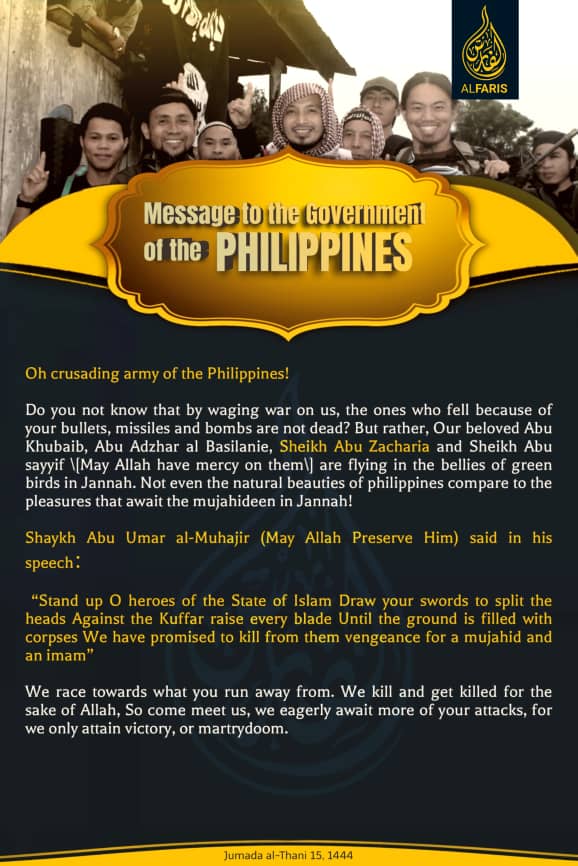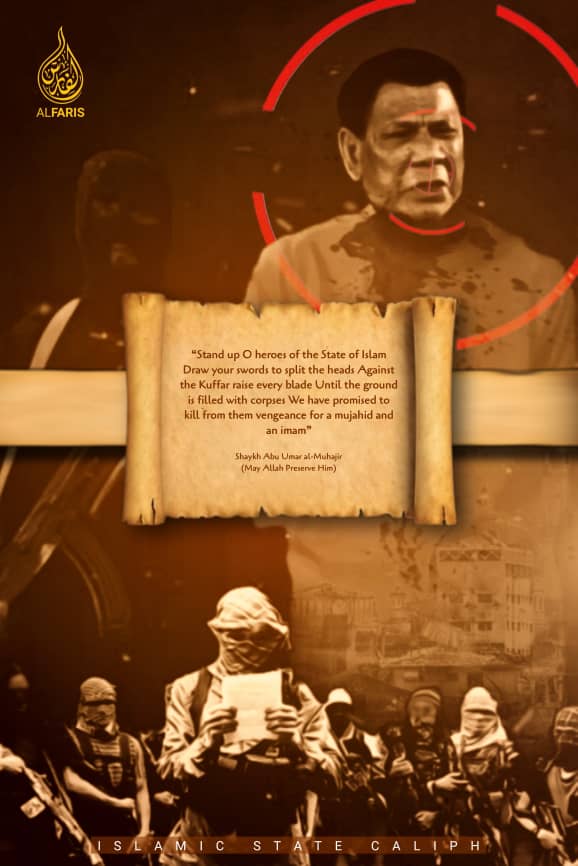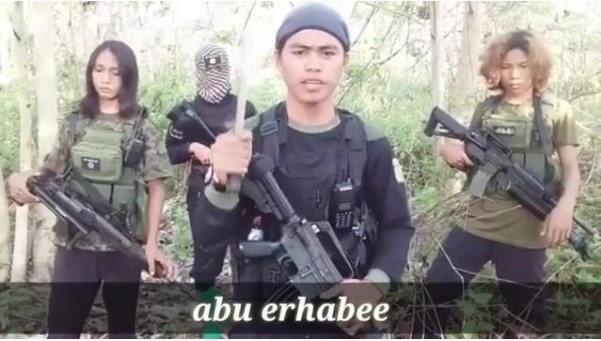What is the East Asia Wilayah?
On 8 January 2023, the main Southeast Asian Islamic State media channel, the East Asia Knights, rebranded itself to the Al Faris Media Channel. In its publications, it repeatedly called itself the East Asia Wilayah (EAW). What does the EAW symbolise and how does this rebranding exercise affect Islamist militancy in the Philippines?
Mindanao in the Southern Philippines has been the operational centre of gravity of pan-Islamist terrorism in Southeast Asia. Since the 1990s, an al-Qaeda-backed Indonesian-based Jihadi group, Jemaah Islamiyah (JI), attempted to create the Rabitatul Mujahideen (Mujahideen Coalition) for armed Islamic groups in Southeast Asia to exchange resources. While this vision did not take off, JI established partnerships with armed Islamist groups based in Mindanao, like the Abu Sayyaf Group (ASG) and the Moro Islamic Liberation Front (MILF). Due to Mindanao’s heavily forested and mountainous terrains and easy access to small arms, JI has deployed their Indonesian, Malaysian, and Singaporean members to both ASG’s and MILF’s safe havens to receive or conduct training.
However, the counterterrorism capacity in Southeast Asia improved and the international pan-Islamist orientation pivoted from JI to supporting the Islamic State (IS) in 2014. This resulted in the operational deficit of the JI and Islamist non-state armed groups splintering from the ASG and MILF to form pro-IS factions. This includes two ASG pro-IS factions in Sulu and Basilan, the Bangsamoro Islamic Freedom Fighters (BIFF) Abu Turayfie Faction, the Maute Group, and Ansar Khilafa Philippines (AKP).
However, as coalition forces gained ground against IS in Iraq and Syria, IS decentralised their operations via the Wilayat (provincial) system. In 2016, IS declared its easternmost province, the Wilayat Sharq Asiyya (East Asia Province) and published the video ‘The Solid Edifice’ featuring three Southeast Asians beheading three kafirs and calling for hijrah (migration) to the Philippines.
Southeast Asian pro-Islamic State groups rallied their forces in the Butig province and sieged Marawi in May 2017 across Lake Lanao. The assault was led by Isnilon Hapilon (the leader of the Basilan pro-IS faction of Abu Sayyaf and the general leader of the East Asia Wilayah) and supported by Omar and Abdullah Maute (founders and co-leaders of the Maute Group) and Dr Mahmud Ahmad (Malaysian University Lecturer and a primary facilitator of fundraising and foreign fighters’ migration for the Marawi Siege). The Marawi siege ended in October 2017, leaving the city decimated and displacing more than 2,200 families.
Is the East Asia Wilayah Appropriate?
Today, the term East Asia Wilayah (EAW) continues to have narrative significance. EAW is meant to invoke the perceived success of the 2017 Marawi siege. It represents the dream of holding and governing territory and symbolises the ambition to rally and unite pro-IS groups in parts of Southeast Asia (Philippines, Indonesia, Malaysia, Singapore, Brunei, Thailand) and East Asia (Hong Kong, Taiwan, Japan, and South Korea).
However, the East Asia Knight (EAK) or Al Faris Media Channel’s mentioning of the EAW does not reflect ground realities. Islamist terrorism in the Philippines is merely a shadow of its former glory. After the AFP liberated Marawi from the EAW, intergroup cooperation between pro-IS militants in Mindanao was negligible. Militants have since refrained from using the term ‘Islamic State’ to describe themselves and instead branded themselves as ‘Dawlah Islamiyah’ (DI), which essentially means Islamic State in their Arabic.
Foreign terrorist fighters (FTF) were mainly recruited by the ASG Sawadjaan faction as suicide bombers between 2019 and 2020. And despite much attention to Abu Zachariah as the prospective leader of DI Philippines, he did not command the same influence as Omar and Abdullah Maute. Moreover, the Armed Forces of the Philippines (AFP) has made significant gains against all terrorist groups in Mindanao. Terrorist leaders were hunted and killed, terrorist sanctuaries were overrun, and hundreds of rank-and-file militants defected to the government.
Moreover, the group appeared to have lost contact with their Indonesian and Malaysian counterparts. Admittedly, the EAK published a picture of an undetonated explosive claimed to be made in Indonesia on 24 November 2022. However, the EAK failed to report the 7 December 2022 Astana Anyar Bombing – the first successful terrorist attack in Indonesia after the Makassar Cathedral Bombing on 28 March 2021. Today, neither East Asia Knights nor Al Faris Media Channel has the capability nor legitimacy to rally regional Islamists to fight their cause.
Attempts to revive the EAW were feeble. In September 2022, East Asia Knights announced the merger of Southern Thailand’s pro-IS media channel, Al Nibras. However, Al Nibras was inactive and only published a video documenting the assault at the Tak Bai Police Station in June 2022. Furthermore, militant activity in the southern Thailand region has also decreased significantly with the promising peace talks between MARA Patani and the Thai government. This erodes the East Asia Knights’ attempts to expand regionally.
Ultimately, it is inappropriate for terrorist groups in Mindanao to refer to themselves as the East Asia Wilayah. The AFP has significantly weakened all terrorist groups in Mindanao. Terrorist groups have made little effort to coordinate between themselves. Groups in Mindanao no longer have strong ties to their regional counterparts. Overall, they have lost their regional legitimacy of being the operational centre of gravity for pan-Islamism.
East Asia Knight’s Rebranding Exercise
The East Asia Knight (EAK) was created on 24 April 2022 and existed mainly on WhatsApp and Telegram. Originally, it was a platform that documents DI attacks, mainly in Maguindanao and Basilan. It has been inactive for three months, from 11 July to 10 October 2022, probably due to the limited battlefield gains against the AFP.
EAK began publishing eulogies of Abu Zachariah and other fallen terrorist leaders. This includes the leader of DI Maguindanao, Salahuddin Hassan (known as ‘Abu Khubiab’ in his eulogy), a certain ‘Abu Adzhar al-Basilanie’ and ‘Sheikh Abu Sayyif’. Along with the announcements in remembrance of their fallen leaders, EAK has also officially changed their name to the Al Faris Media Centre.

Figure 1: Al Faris Message to the Government of the Philippines (8 January 2023)
With little productive content to raise the morale of their followers, administrators attempted to renew their commitment to wage jihad against the Philippines government. However, unlike pan-Islamists from other regions, one running the Al Faris Media Channel appeared to have a weak comprehension of local politics. Along with the threat against the Philippines government, the Al Faris Media Channel originally targeted immediate past president Rodrigo Duterte on 8 January 2023 without realising that he is no longer the President of the Philippines. A subsequent message was published on 12 January 2023 indicating that President Ferdinand Marcos Jr is wanted by the group “Dead or Alive”.

Figure 2: Al Faris Threat against Rodrigo Duterte (8 January 2023)

Figure 3: Al Faris Threat to Ferdinand Marocs Jr (12 January 2023)
The terrorist media channel continues to suffer losses. On 16 February 2023, the group acknowledge that the main administrator of Al Faris Media Channel was arrested by the Philippines. While this claim did not align with any media reports, an account with the username “abu_turaifie” started a TamTam Channel called “The Philippines” in attempts to replicate efforts of Al Faris. His first order of business is to publish an audio recording titled “Pangoyat Ko Mga Muslim” (I encourage Muslims) in the Maranao dialect. Subsequently, the same account endorsed a new leader of Dawlah Islamiyah Philippines, “abu erhabee”.

Figure 4: The new leader of Dawlah Islamiyah Philippines is endorsed
Evidently, these threats issued by the Al Faris Media Channel are not backed by operational capabilities. However, is the rebranding exercise merely symbolic without substance? Not quite. The rebranding from the East Asia Knights to Al Faris Media Channel seemed to be motivated by their realisation that the term “Knights” has Christian origins – especially when they call their enemies crusaders. Al Faris translates to “knights” in Arabic, or more accurately, “horseman”. This is more than a symbolic rebranding – the group is learning.
Beyond rebranding, the group appears to engage in problem-solving cyber innovation. The authorities and major social media platforms are engaged in a learning competition with terrorist groups. Therefore, when WhatsApp and Telegram became more effective in detecting and disrupting their digital operations, the EAK migrated and exploited other more obscure platforms to spread propaganda. The Al Faris Media Channel no longer exists in WhatsApp and Telegram. They are present on unregulated social networking platforms like TamTam, Element, and RocketChat.
The War on Narratives
Undoubtedly, in the battle of narratives, the terrorists tend to have strategic initiative not only in agenda-setting but also in the medium of sharing propaganda. While platforms like TamTam, Element, and RocketChat promise users convenience, privacy, and encryption, they are highly unregulated and hence allow extremist content to proliferate on their platforms. Even if these platforms eventually improve their regulatory capabilities, terrorist groups are likely to continue their migration to more obscure platforms. Governments are constantly playing catch-up as there is still little progress in transferring regulatory capabilities from more established social networking platforms to smaller ones.
However, localised online activity needs to be backed by perceived successes on the battlefield. Hence, the Al Faris Media Channel’s sparse propaganda operation is limited to historical accounts of the Marawi Siege and threats against the government as they do not seem to have the capability to circumvent AFP’s military pressure. The Al Faris Media Channel seemed to understand its operational limitations and has attempted to borrow the legitimacy of other Islamic State groups to bolster its own. Al Faris Media has increasingly complemented its online propaganda with content from other conflict theatres in the Middle East (Northern Iraq Province, Sham Al-Barakah Province) and Africa (Islamic State West African Province, Islamic State Central African Province, Mozambique Province). They have also increasingly used the website telegra.ph to share translated transnational battlefield updates.
The Al Faris Media should also be concerned about the high rates of militant defections to the government. The Philippines government empowered local authorities to run their own soft-power programmes to convince rank-and-file militants to surrender and receive government assistance. Civil society organisations (CSOs) such as the Balay Mindanaw Foundation (Project Good Life is a similar programme targeting Communist insurgents in the Philippines) have worked closely with the AFP and local authorities to implement programmes to rehabilitate and reintegrate former combatants into society. On 23 January 2023, Al Faris Media attempted to debunk the government’s propaganda with the following message, translated from Tagalog:
…
Oh you Intel, Murtad, Soldiers, Police, Kafgo especially the GENERALs who are reading my post?
Oh you Intel, Murtad, Soldiers, Police, Kafgo especially the GENERALs who are reading my post?
…
So think about yourselves or Muslims, maybe you have made an alliance, cooperated and made friends with the enemy of Allah, you have committed a great sin without realizing it. I encourage Muslims, no matter what tribe or you are a return to Islam, do research on your religion and find the right one, and may your research wake up to the enormous illusion that the kuffar have placed on us using
Democracy
Good livelihood
Western education
And much more
These are their pa.en so that you abandon your religion and become one like them.
The Ulama and uztadz know that nothing can save us but the religion of Islam, not such worldly things.
But unfortunately, even though they are hiding the truth, they still encourage morits to inform on their fellow muslims because they are afraid of being shot by the kuffar or losing their salary from them.
It is evident from the message that the administrators are facing internal pressure from the high rates of militant defection, particularly from the ASG and BIFF. Administrators of Al Faris Media Channel argue that aligning and receiving assistance from the kuffar government is un-Islamic. Although not explicitly stated, this is based on the uncontextualised principle of al-wala wal-bara (loyalty and disavowal) propagated by al-Qaeda and Islamic State which asserts that Muslims are not allowed to befriend or be associated with non-Muslims.
The narrative may appeal to certain segments of society. Al Faris Media Channel appeared to be preying on the general ignorance of religious knowledge among combatants to stop the bleeding. According to a recent survey conducted by the Institute for Autonomy and Governance (IAG), 50.4% of the youth surveyed in conflict-affected areas in urban and rural communities agree or strongly agree that jihad qital (armed struggle) is an obligation of all Muslims. 67.8% of the same respondents agree or strongly agree that discrimination against the Moros is a sufficient justification to bear arms and fight. The report indicated that this perspective is driven by poverty and poor access to education.
Conclusion
The rebranding exercise must be assessed with tact. Firstly, by refraining from fearmongering. The digital rebranding exercise is merely that; it is not evidence of threat escalation. Dawlah Islamiyah forces have lost most of their operational capabilities and militant legitimacy. The operational context, inter-organisational coordination, and regional contacts do not favour the resurgence of East Asia Wilayah. The AFP, CSOs, and local governments have effectively eroded the ranks of Dawlah Islamiyah through hard and soft-power approaches. The groups are significantly weakened.
However, analysts should avoid complacency. The rebranding of East Asia Knights to the Al Faris Media Channel is not merely a symbolic gesture; it reaffirms the ambition of the remaining militants to repeat the perceived success of East Asia Wilayah and signals their ability to learn as an organisation. Messages from the Al Faris Media Channel highlight the group’s ability to learn and innovate from their mistakes. In conclusion, Dawlah Islamiyah, although weakened, continues to be dynamic and responsive to government policies and local concerns.
[Kenneth Yeo is a senior research analyst in the International Centre for Political Violence and Terrorism Research (ICPVTR), a constituent unit of the S. Rajaratnam School of International Studies based in Singapore.]
These are their pa.en so that you abandon your religion and become one like them.
The Ulama and uztadz know that nothing can save us but the religion of Islam, not such worldly things.
But unfortunately, even though they are hiding the truth, they still encourage morits to inform on their fellow muslims because they are afraid of being shot by the kuffar or losing their salary from them.
It is evident from the message that the administrators are facing internal pressure from the high rates of militant defection, particularly from the ASG and BIFF. Administrators of Al Faris Media Channel argue that aligning and receiving assistance from the kuffar government is un-Islamic. Although not explicitly stated, this is based on the uncontextualised principle of al-wala wal-bara (loyalty and disavowal) propagated by al-Qaeda and Islamic State which asserts that Muslims are not allowed to befriend or be associated with non-Muslims.
The narrative may appeal to certain segments of society. Al Faris Media Channel appeared to be preying on the general ignorance of religious knowledge among combatants to stop the bleeding. According to a recent survey conducted by the Institute for Autonomy and Governance (IAG), 50.4% of the youth surveyed in conflict-affected areas in urban and rural communities agree or strongly agree that jihad qital (armed struggle) is an obligation of all Muslims. 67.8% of the same respondents agree or strongly agree that discrimination against the Moros is a sufficient justification to bear arms and fight. The report indicated that this perspective is driven by poverty and poor access to education.
Conclusion
The rebranding exercise must be assessed with tact. Firstly, by refraining from fearmongering. The digital rebranding exercise is merely that; it is not evidence of threat escalation. Dawlah Islamiyah forces have lost most of their operational capabilities and militant legitimacy. The operational context, inter-organisational coordination, and regional contacts do not favour the resurgence of East Asia Wilayah. The AFP, CSOs, and local governments have effectively eroded the ranks of Dawlah Islamiyah through hard and soft-power approaches. The groups are significantly weakened.
However, analysts should avoid complacency. The rebranding of East Asia Knights to the Al Faris Media Channel is not merely a symbolic gesture; it reaffirms the ambition of the remaining militants to repeat the perceived success of East Asia Wilayah and signals their ability to learn as an organisation. Messages from the Al Faris Media Channel highlight the group’s ability to learn and innovate from their mistakes. In conclusion, Dawlah Islamiyah, although weakened, continues to be dynamic and responsive to government policies and local concerns.
[Kenneth Yeo is a senior research analyst in the International Centre for Political Violence and Terrorism Research (ICPVTR), a constituent unit of the S. Rajaratnam School of International Studies based in Singapore.]
https://gnet-research.org/2023/03/01/rebranding-the-east-asia-knights-a-reflection-of-dawlah-islamiyahs-effort-to-learn/

No comments:
Post a Comment
Note: Only a member of this blog may post a comment.